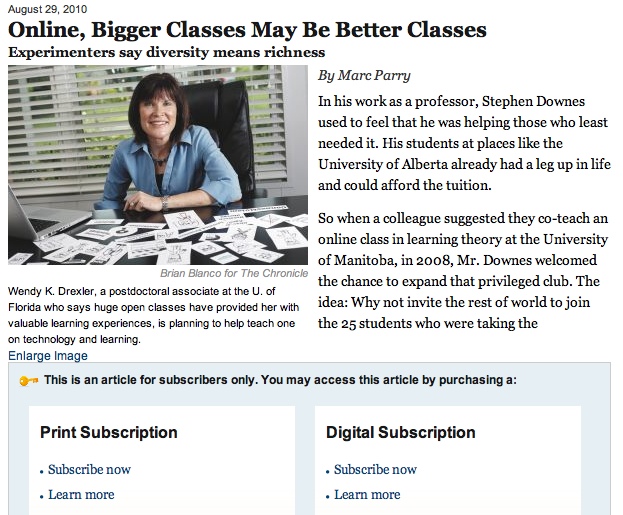 Mike Caulfield has a good post about how Facebook and siloed social media got traction in ways the blogosphere circa 2005-2008 never maintained. He has a good point about the user experience – people aren’t going to go look at 10, 100, 1000 different websites with different graphic designers, publishing models, and navigation structures. That’s where the simplified UX of Facebook comes in. A single stream, pulling stuff from everyone a person cares about. And that jerk from junior high.
Mike Caulfield has a good post about how Facebook and siloed social media got traction in ways the blogosphere circa 2005-2008 never maintained. He has a good point about the user experience – people aren’t going to go look at 10, 100, 1000 different websites with different graphic designers, publishing models, and navigation structures. That’s where the simplified UX of Facebook comes in. A single stream, pulling stuff from everyone a person cares about. And that jerk from junior high.
But, if it was just about having a streamlined user experience and consistent email-like interface, RSS readers solved that a decade ago. Google Reader was that. Fever˚ still is that for me. I don’t think that’s why Facebook is where every non-geek hangs out. I think there are a few reasons why people are there:
- Because non-geeks don’t want to publish openly. They want to share things with their friends, and only their friends. I also see this with instructors and students – many just want to share with people in their class/section/group. That’s why the LMS is still so core on campus – it’s basically a clunky version of the Facebook UX pattern – share stuff with the people in a small context, and only those people. Ask non-HTML-syntax-nerds about how they share things. Many will say “share? Why would I do that? That’s so high school! Why would I want people to know that?” Or “OK. Maybe my friends would be interested in photos of my vacation. But I sure as hell ain’t posting them on the web!” Or some variant. Facebook soothes people into thinking they’re sharing only with people they’ve let into their groups. That’s something that the blogosphere never did, and it’s something that held back a lot of people from participating in the open blogoweb back in the olden days.
-
Because normal people don’t want to think about stuff like domains, or backups, or updates and patches, or plugins and modules. They just want to see what their friends and family are up to, and maybe post some clever photos. And, although webstuff is way easier to manage than it was back in the dark ages, it’s still not as easy as it needs to be for dad to use it.
-
Because that’s where everybody is. Facebook feels like a place. It’s tangible. That’s also something that the distributed blogothingy never achieved. It’s something different for every participant or observer. Facebook is Facebook. Everybody is there. Because there’s a “there” there.
So, we can either fight against Facebook and insist that everyone leave it and do things The Right Way™ – or come to terms that for the vast majority, Facebook (or the siloed design pattern represented by Facebook) is what they are comfortable with. And that’s OK. That doesn’t stop anyone from doing things more openly. The web is what we make of it. If we think there are better ways, and that openness is important, we need to continue modelling and exploring. But we can’t expect people to follow. Or to even be interested. Or to not think we’re freaks for doing things out in the wilderness.
And maybe, part of our explorations will involve finding ways to make the wilderness more approachable. Maybe we’re building trails and national parks so city folk can experience things they wouldn’t otherwise experience. I’ve got some ideas about that, and am hoping to get the chance to help build some stuff…


